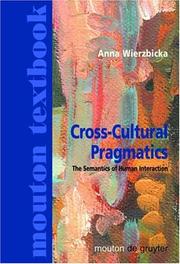| Listing 1 - 2 of 2 |
Sort by
|
Book
ISBN: 9783631588154 Year: 2009 Publisher: Frankfurt am Main [etc.] : Lang,
Abstract | Keywords | Export | Availability | Bookmark
 Loading...
Loading...Choose an application
- Reference Manager
- EndNote
- RefWorks (Direct export to RefWorks)
Complimenten geven (communicatie). --- Compliments. --- German language --- Gespreksanalyse. --- Russian language --- Vergelijkende grammatica --- Grammar, Comparative --- Russian. --- Grammar, Comparative --- German. --- Russisch-Duits.

ISBN: 3110177692 3110125382 3110220962 128342911X 9786613429117 9783110177695 0899256996 3110137879 9783110220964 9780899256993 9783110137873 9783110125382 Year: 2009 Volume: 53 Publisher: Berlin Boston
Abstract | Keywords | Export | Availability | Bookmark
 Loading...
Loading...Choose an application
- Reference Manager
- EndNote
- RefWorks (Direct export to RefWorks)
This book, which can be seen as both a research monograph and a text book, challenges the approaches to human interaction based on supposedly universal "maxims of conversation" and "principles of politeness", which fly in the face of reality as experienced by millions of people - refugees, immigrants, crosscultural families, and so on. By contrast to such approaches, which can be of no use in crosscultural communication and education, this book is both theoretical and practical: it shows that in different societies, norms of human interaction are different and reflect different cultural attitudes and values; and it offers a framework within which different cultural norms and different ways of speaking can be effectively explored, explained, and taught. The book discusses data from a wide range of languages, including English, Italian, Russian, Polish, Yiddish, Hebrew, Japanese, Korean, and Walmatjari (an Australian Aboriginal language), and it shows that the meanings expressed in human interaction and the different "cultural scripts" prevailing in different speech communities can be described and compared in a way that is clear, simple, rigorous, and free of ethnocentric bias by using a "natural semantic metalanguage", based on empirically established universal human concepts. As the book shows, this metalanguage can be used as a basis for teaching successful cross-cultural communication and education, including the teaching of languages in a cultural context.
Conversatieanalyse. --- Gespreksanalyse. --- Interculturele communicatie. --- Interculturele pragmatiek. --- Pragmatiek. --- Semantiek. --- Taalhandelingen. --- 801.56 --- Intercultural communication --- Pragmatics --- Semantics --- Speech acts (Linguistics) --- Illocutionary acts (Linguistics) --- Speech act theory (Linguistics) --- Speech events (Linguistics) --- Formal semantics --- Semasiology --- Semiology (Semantics) --- Pragmalinguistics --- Cross-cultural communication --- 801.56 Syntaxis. Semantiek --- Syntaxis. Semantiek --- Pragmatics. --- Semantics. --- Intercultural communication. --- Speech acts (Linguistics). --- Interkulturelle Kommunikation --- Language and languages --- Linguistics --- Speech --- Comparative linguistics --- Information theory --- Lexicology --- Meaning (Psychology) --- General semantics --- Logic, Symbolic and mathematical --- Semantics (Philosophy) --- Communication --- Culture --- Cross-cultural orientation --- Cultural competence --- Multilingual communication --- Technical assistance --- Philosophy --- Anthropological aspects --- Lexicology. Semantics --- Sociolinguistics --- Philosophy of language --- Social psychology --- Communication interculturelle --- Pragmatique --- Sémantique --- Actes de parole --- Études transculturelles
| Listing 1 - 2 of 2 |
Sort by
|

 Search
Search Feedback
Feedback About UniCat
About UniCat  Help
Help News
News